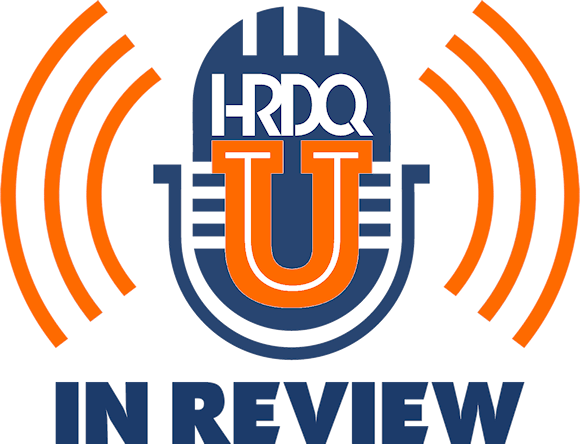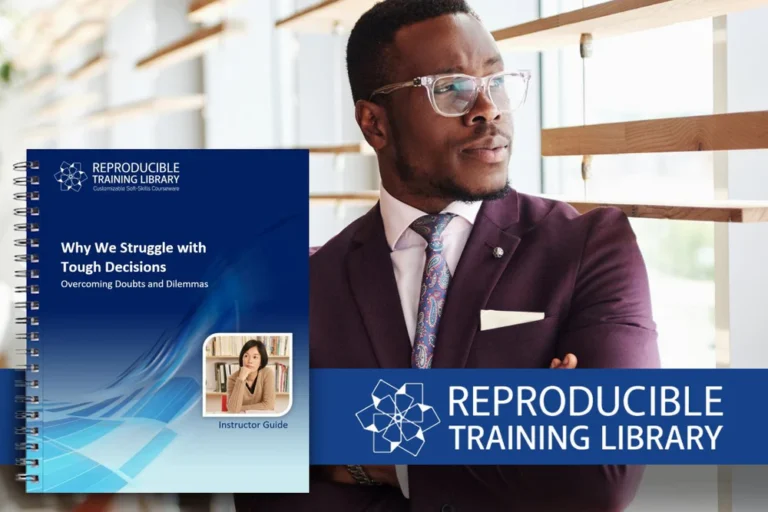

Have you ever found yourself reacting to a situation and wondering, Why did I respond that way? Chances are a subconscious thought pattern was at play.
In this episode of HRDQ-U In Review, leadership expert Marsha King joins us to explore the concept of pattern thinking – the thought patterns and mental models that shape how we interpret the world, make decisions, and lead others. Drawing from her HRDQ-U webinar, Marsha dives into how these patterns form, why they’re so persistent, and what you can do to change them.
You’ll learn how past experiences (even those from childhood) influence your behavior today – and how greater self-awareness can lead to stronger relationships, better leadership, and more intentional choices. Whether you’re a coach, a leader, or simply someone looking to grow, this episode will help you uncover the why behind your choices and start shifting unhelpful thought patterns.
“Behavior can change. You’re not stuck. Understanding your patterns gives you the power to choose something different.” – Marsha King
Listen and learn:
Resources:
00:01
Welcome to this week’s episode of the HRDQ-U In Review Podcast where we bring you the latest insight and practical tools for enhancing soft skills training in your organization. This podcast is brought to you by HRDQU.com and I’m your host, Sarah, Learning Events Manager at HRDQ-U. Today we are joined by Marcia King to discuss the webinar, Pattern Thinking, Discover the Why Behind Your Choices.
00:23
hosted by HRDQ-U. And before we dive in here, make sure you subscribe to our newsletter at HRDQU.com for exclusive updates, upcoming webinars and resources to help you and your team excel. Marcia, welcome. Thanks so much for joining me today. Absolutely. It’s a joy to be here. Thank you.
00:41
So a couple of weeks ago, we presented this webinar and we had a really great engaged audience with us. But I would love for those that are just tuning in that haven’t had the opportunity to check out the webinar yet, could you share a little bit about your background and what led you to explore the concept of pattern thinking? Absolutely. And I put some thought into this before you and I spoke, because I really wanted to pull back the layers and figure out where did this
01:09
become a topic of interest for me. So I’ve been doing leadership development for decades. So 25-ish years, I’ve been developing leaders, which is my passion. I love it. And it’s really clear that leaders have particular ways of thinking, and they’re different. So you may have, I don’t know, five executives in a room, and they all think differently. And to me, that’s just infinitely fascinating that people that are at the same level, same experiences, and so on.
01:39
They think so differently. that was, that’s the first reason that I think that this is an important topic, but where it became very personal for me is especially early in career, I could name experiences where I felt very misunderstood. And so I would be, I don’t know, in a position in a conversation on a project. And there were times where I felt like I was.
02:09
saying things, talking about things, trying to push the project along and being completely misunderstood. And not just me misunderstood with what I was saying, but also there were misunderstandings about what I believed in and how I thought. And, and I was so shocked by that. And so I, I really had to sit and ask myself, what am I doing to lead people to think something that’s just not right? Something that I don’t, at least that I don’t think is right.
02:38
And so what I came to is that we all bring our own backgrounds, experiences, everything that happens to us in our lives. We bring that with us everywhere. And so I was bringing that with me. And so I’m giving off signals that I may or may not realize I’m giving off, but those that I’m engaging with have done the exact same thing. And so they are interpreting my behavior, my whatever.
03:07
differently than what my intentions were. And so it’s all been about leadership development, but I would have to say that that is the piece that really made me fascinated in this is how can I be misunderstood when I think I’m being so darn clear? So that’s largely where it came from. And then of course, know, just how the diversity and how people think I’m just very, very fascinated in that. Yeah, because we’re also formed by our experiences that have an impact on how we perceive.
03:36
statements and other people’s ideas and opinions. Right. have, it’s almost like we have our own glasses on lenses and those lenses are developed over years, over years, over decades, and they begin developing as early as in utero. I mean, it is, we start developing our experiences and our thinking process and our thinking patterns immediately. Um, and they also don’t end.
04:05
Now, I will say most of them are created early in life and then we carry those forward. Once we have a thinking pattern, and I’ll give you an example of one in a moment, but once we have a thinking pattern, they usually don’t change. In fact, what we tend to do is without, know, it’s not intentional, but we are constantly validating the thinking pattern that we’ve already created. So it becomes kind of a cycle. So it’s hard to get out of it.
04:35
unless you are very intentional about it, unless you recognize that, okay, this is a thinking pattern that may have worked for me at one time, but it doesn’t work for me anymore. So I need to do something about it. And to further that point, how do you define thinking patterns and why are they so important to understand in our personal and professional lives? That’s such a good question. We should have started there. So what is it? So a thinking pattern is like a process that our brain goes through.
05:05
to explain, I don’t know, a situation, a relationship, it explains something and we kind of get stuck in it. So I may, I’m having a conversation with you and I may have an experience where I think she’s so bubbly, she’s very extroverted, I enjoy being with her, I’m going to reach out to her often. The reality is you may be an off the chart introvert and I just don’t realize it. I’ve misunderstood it. So…
05:34
I may carry that forward in our relationship wearing you out or whichever way, either wearing you out or not capitalizing on some of the energy that you may have. So I may have completely missed the boat on who you are, but I am so stuck in that way of thinking that unless something happens to stop that cycle, I’m going to continue thinking of you the same way.
06:03
And that’s so funny because I know that was just your example, but people do assume because of the line of work that I am that I am an extroverted person and I am the complete opposite. I relate to that. think, you know, it’s so funny because I am definitely an introvert and because I do public speaking, because I teach the university, you know, I’m always in social settings. People always assume I’m an extrovert. And when I tell them, no, I’m, I’m actually an introvert. They’ll argue with me.
06:33
I’m still actually saying, no, no, no, no, you’re an extrovert. And I’m like, no, promise. I promise I’m an introvert. So they get stuck in a cycle. So you can see how this just kind of cascades. sometimes I’m just astonished that we can actually have conversations and relationships that lead to productivity because of so many of the misunderstandings that’s.
07:00
that we create because of these lenses that we wear. And that’s the perfect segue here into my next question for you. So what are some signs that someone might be stuck in a thinking pattern that’s no longer serving them? See, that’s such a good point. And I like the way you said it, no longer serving them. Thinking patterns usually start out helping us. OK, so let me give you an example. A really big one that I have is, if I want something done, I have to do it.
07:28
So that’s a thinking pattern I have. I have battled that my whole life. And I probably will continue battling it. Fortunately, I know that I’m battling it, so that makes it a little bit better. But it serves me to a certain point. So what I call it is a strength overused. So the way that you detect this is that somebody is, I don’t know, using this thinking pattern of productivity to be very successful.
07:58
But what gets you here won’t get you there. And so you see it falling apart when there’s a transition of some nature in their life, their work, where they need to change that thinking pattern, but they don’t because it’s always been a success for them. So there’s a point of diminishing returns to the point where it actually becomes a problem. The whole idea behind thinking patterns is that we create them
08:28
because it’s helping us. It helps us to explain the world around us. It helps us to have these mental shortcuts that we can use, particularly in times of stress or crisis. But we don’t let go of them when we need to let go of them. We don’t change when our circumstances change. So when our circumstances change, our thinking needs to change. We need to evolve with it. And when we get stuck in a thinking pattern, we don’t evolve. And so you see people saying the same thing over and over.
08:58
You know, there’s a few cliches that we’ve all heard and one of them is, and we’ve all worked with this person, somebody who says, it’ll never work. This will never work. We will never get buy-in. That is a thinking pattern that’s very defeatist that we can hear over and over. And when you hear that over and over, you know that they have fallen into that thinking pattern.
09:26
so significantly that they don’t even know they’re doing it. So that’s general right now. That’s how you see it. You hear it over and over and you see them doing behaviors over and over. And during the webinar, you shared how thinking patterns shape our choices. Can you walk us through a real world example of how this plays out? Absolutely. So one of the examples I gave in the session, which I think is a really good one, is assumptions that we make. So let’s say I am
09:55
I schedule a meeting with my manager and she cancels. I don’t know why she cancels, but she cancels. And so I take this mental note, okay, she’s canceled, something’s wrong, I don’t know what’s going on. And then I don’t hear from her and she doesn’t reschedule in like say a week. I reach out after a week, nothing. then the seed is planted and the seed that’s planted, it depends on the person.
10:22
And some of us go to a really negative place. So it would be very easy to go to that place where you think to yourself, my manager doesn’t respect me. Now, you see how that, how it’s like a very irrational connection that my manager cancels a meeting within a week, I’ve decided that she doesn’t respect me. I mean, it’s really kind of silly when you think of it that way. But that’s how it happens. And then because it’s been planted,
10:51
because we’ve experienced it without even knowing it, our brain starts watching for it. And so we, anything that happens after that point, let’s say, let’s say she schedules the next meeting. However, I pass her in the lunchroom and she doesn’t make eye contact. Okay, so that is another seed that is just, at that point, the story has been created. Okay, so then I go into the meeting that she’s actually rescheduled.
11:21
And I’m anxious and I feel like I’m under scrutiny because I’ve already convinced myself my story is that she doesn’t respect me. And so the choice I make is to be quiet or to be, don’t know, whatever it is I think that maybe anxious or maybe what she, what I think she wants me to be. So that’s really dictating my behaviors versus me being the person that I think I need to be and,
11:48
producing work the thing, the way I think I should be doing it, using my own expertise. Instead of that, I’m cowering really into the fear of the story that I’ve created for myself. It sounds extreme, but it’s not. This happens every single day. And we just don’t know it. We don’t realize it. And how can understanding your own patterns lead to better decision-making and stronger relationships?
12:17
That’s like the turnaround question. So can we turn this around without a shadow of a doubt, without question? We can completely change this and we change it one by just being aware. So saying to ourselves, and I’ve done this, you know, when I’m in, let’s say, if I ever, and this is probably earlier in career, I’m pretty confident now, but maybe earlier in career I wasn’t quite as confident and…
12:46
something may have happened and I have forced myself to stop and ask myself, she didn’t make eye contact with me. Could that mean something, anything else other than she doesn’t respect me? Is there any other option that or any other outcome or reason that this occurred again? And if I really push myself, I mean, there’s probably a hundred reasons that
13:15
this occurred that does not mean she doesn’t respect me. So there’s just one though that says she doesn’t respect me and so many others that doesn’t imply that but I tend to stick to the one. So if you are able to acknowledge that you and you can get feedback from friends, you can actually do a lot of self-reflection, you can journal, you can work with a coach, you can take assessments, there’s all kinds of ways to figure out
13:45
Do you have thinking patterns that are more of a hindrance, that’s sabotaging you basically? Do your thinking patterns sabotage you? And we all have them, and we all have them that may sabotage us. Those with greater self-awareness are the ones that are able to figure out when do they have it, and then…
14:09
self-regulation is how to shift your own thinking so that you do not fall back into that pattern.
14:23
behind our choices. How do some start uncovering their?
14:30
It is hard because it usually comes from childhood. So most of our thinking patterns are created anywhere between zero and 18ish, 20, 22. So what it requires is that we take a lot of time and really think back, okay, when is the first time I felt this? So like, let me give you an example. So I have been coaching this gentleman who he has…
14:59
His biggest issue is that he gets very angry at his team. If he thinks his team has not achieved what they should have achieved. And so instead of being productive and being supportive, he gets really angry. I mean, really angry at them and sends off. Now, he’s not a yeller, he’s not a screamer anything, but you can give off the same signals. You can create fear in people.
15:27
without actually yelling. I mean, it could just be a glance. And so I’m working with him. And what we’re able to figure out is that he had a pretty difficult life growing up. His father passed away when he was a young teenager. He ended up supporting his, he had, his mother was unable to make a living. He had two sisters. He ended up supporting the family. I mean, from like age 15. So,
15:53
It came time to go to college and he had to go to the local community college when all of his other friends were going to Ivy Leagues. And so when he was in the workforce, fast forward 20 years later, he’s very successful because obviously he’s an incredibly hard worker. He took care of his family. He put both of his sisters through college. So he’s a huge success. But if he even sniffs one ounce of entitlement, he goes off.
16:20
Because he didn’t have the luxury of being entitled. All he had was grit. Grit, work hard. And if he feels, if one of his employees demonstrates to him that they felt like they deserved more than what he thought they deserved, because he felt like they were not working as hard as they should. But he’s basing that on how he worked.
16:49
It’s an irrational connection because his team situation is not his childhood. So he’s making an irrational connection between his experience and their experience. And so that’s when, um, that’s when a coach can really help a coach can help you really figure out where is this coming from? And so I always say, if you want to create change, understand what you do.
17:15
If you want to sustain change and even build momentum on change, you also have to understand how you do it and why you do it. And that takes the reflection that takes the stuff about digging back in the background. Now, a lot of people would think that’s therapy. really isn’t therapy is if you go back and you, um, if you try to heal that 15 year old and that that’s therapy, that’s not what coaches do. Coaches go back and figure out where did the issue come from? And then they fast forward.
17:45
and move forward so that they can help the person they’re coaching understand where it came from, how it’s coming out, why people see it the way it is, and also that it’s an irrational connection. So can it be fixed? Absolutely. And there’s resources all over the place that would help us with that. We’ve got good friends, colleagues at work that are trusted advisors. Many of us have wonderful managers that will help us with this.
18:12
There’s assessment tools, there’s coaching, there’s mentoring, there’s all kinds of things that can help us to figure that out. But number one is that we’ve got to identify, do we have them? And we do. Everybody has them, tens of them, hundreds of them, everybody. They also tend to run in packs. So we usually, if you’ve got, for example, if you’ve got mental models around people in positions of authority,
18:38
You probably have multiple of them in that area about what authority means to you. And this particular gentleman did for sure. He had issues with people in positions of authority because he was so let down and so hurt. I mean, you can’t, it’s very difficult to overcome the death of a parent at such an early age. But I’ll tell you, I mean, he has, he’s done remarkably well. This was years ago.
19:07
but he’s very successful today and he has learned that his experience should not impact the experiences of the people around him. That’s his big learning and he did it. And he did it through coaching. He did it through mentoring. He did it through self-reflection. And I’m very proud of him. And a lot of people have that experience. I mean, that is really, that’s the sweet spot when you can one, acknowledge you have them, two, identify what they are, three,
19:35
reflect on where they came from and then four, what is the best path forward? How do you want to be? So I guess that would even be the final piece is who do you want to be as a leader and are your thinking patterns preventing you from being that person? And I would say a lot of times that’s the case. So figuring out who you want to be as a leader, I think is very critical as you go into this reflective process to figure out.
20:04
Do your thinking patterns support who you want to be as a leader? And so how can leaders use this knowledge of patterns to better support their teams or coaching clients? So how can these leaders use this information to better support their well, one, identify what their own own patterns are and learn to self-regulate, know, pay, learn to control yourself. But two, and this is very powerful, admit them, tell people.
20:34
Tell your team, this is something I struggle with. If you see me falling into this pattern, you’ve got my permission to say something. Now, I mean, that’s difficult because leaders have positional power. And so it’s difficult to bank on your employees absolutely telling you what they’re seeing, especially if it’s something that’s not so great. So you can’t totally depend on that.
21:04
but you really do want to create the safest psychologically safe environment that you can so that it diminishes the positional power that you have over your team. I’ve had that, I’ve had phenomenal managers where I felt 100 % comfortable going to them and saying, this is an issue for me. This is something I’m seeing and it’s really bothering me or it’s preventing me from being my best self. I’ve also had managers where
21:34
I felt like I had that permission, but I brought it up and it didn’t go well. So that, by the way, could then cycle into a new thinking pattern or mental model that, you know, don’t give senior leaders feedback because they’re not going to take it. So I’ve gotten lost in the question, but I think I answered it. Did I answer the question? You did answer the question. Thank you. And so what would you say?
22:01
a common misconception people have about changing their behavior or their mindset patterns? There’s a lot of people who say, I am who I am. And I say, you know what? Your personality is your personality. I don’t think personalities change, but that doesn’t mean your behaviors don’t change. You can always change your behavior. I forget who it was. Some researcher, think it was Kurt Lewin, who said there’s, um, there’s
22:30
nothing more powerful. I forget how he says it, but basically what it means is that we all have personality quirks, but they’re really meaningless because behaviors is what people see and feel. So we can absolutely control our behaviors towards other people or with other people. So it’s important to know what your mental models or what your thinking patterns are, but it’s also important to acknowledge that that’s not your identity.
22:59
So your identity really is the relationship you have with people and how you treat people. That’s behavioral. we can have like you’re a good example, I’m good example. We can be introverts but we can also demonstrate being an extrovert when we need to. So we’re able to put that hat on and off. So that’s actually a really good example. Just because I’m an introvert doesn’t mean I don’t show being an extrovert. I show that when people…
23:28
When the people around me need it is when I show it. What about you? How does it, how did that work for you? Yeah, I think it’s the same. It’s when, when the opportunity arises that that’s what’s needed and expected of me. I, I can. You rise to the occasion, right? So personality doesn’t mean that much really in the, the, in the long run. And what I always tell, this is the example I always use when it comes to personality is criticizing someone’s personality is like criticizing their eye color.
23:58
I mean, you just can’t, it’s just futile to criticize or try to change personality. Behaviors, it’s a whole different ball game. Behaviors can be changed and that’s what we want. And a lot of times I know this sounds kind of, I don’t know, maybe rude, but I don’t care what someone’s personality is. All I care is about how do they treat people? That’s it. How do they make people feel? Because how they make people feel is what is lasting. That’s what they’re going to remember for the rest of their life. And…
24:27
If you treat them well, guess what? You’re going to help them to create a really positive thinking pattern. If you don’t treat them well, same thing. You’re going to reinforce potentially a negative thinking pattern from them. Yeah. And finally, Marcia, where can listeners go to learn more about your work? I’m sure they’re going to want to be able to connect with you and hear more of what you have to say on the journey of self-awareness that they have.
24:54
Thank you, thank you for asking that question. So I’m the director of a leadership coaching certification program at the University at Buffalo and it’s in the School of Management. It’s called the Center for Leadership and Organizational Effectiveness, but it’s called the Leadership Coaching Certification. Easy to find, just Google Center for Leadership and Organizational Effectiveness coaching.
25:22
certification, Marsha King. If you Google that, you’ll go right to it. And these are the concepts that I teach throughout the entire program. It’s an eight month program. You will, by the end of the program, you’ll have understanding of topics like this, but many, many, many more. And what I really like about this program is that it’s not just for people who want to become coaches. It’s for leaders also. And it’s for parents. It’s for friends.
25:50
It’s for grandparents, it’s for mentors, it’s for everybody. These tools enrich life. Actually, I’m going to go so far as to say this and I really do believe it. These tools transform lives and that’s really, really important and impactful. So that’s where I think that that would be the best place. Reach out to me anytime. I will talk to people all day, every day about thinking patterns because I just think they’re so important. Yeah. And we will have all of this information linked down below.
26:20
and her team. Marcia, thank you so much for your time today. Thank you. This was a blast. I appreciate it. And we hope you enjoy listening to the HRDQ-U In Review podcast available on all major streaming platforms. If you did enjoy today’s episode, make sure to give us a follow and leave us a five star review. Thank you all for tuning in to this week’s episode of the HRDQ-U In Review podcast brought to you by HRDQU.com.


Listen to this podcast event at no charge with your
HRDQ-U Free Access Membership
Have you ever found yourself reacting to a situation and wondering, Why did I respond that way? Chances are a subconscious thought pattern was at play.
In this episode of HRDQ-U In Review, leadership expert Marsha King joins us to explore the concept of pattern thinking – the thought patterns and mental models that shape how we interpret the world, make decisions, and lead others. Drawing from her HRDQ-U webinar, Marsha dives into how these patterns form, why they’re so persistent, and what you can do to change them.
You’ll learn how past experiences (even those from childhood) influence your behavior today – and how greater self-awareness can lead to stronger relationships, better leadership, and more intentional choices. Whether you’re a coach, a leader, or simply someone looking to grow, this episode will help you uncover the why behind your choices and start shifting unhelpful thought patterns.
“Behavior can change. You’re not stuck. Understanding your patterns gives you the power to choose something different.” – Marsha King
Listen and learn:
Resources:
[ PODCAST PLAYBACK ]
You must be signed-in with your membership account to access this content.
Enjoyed this podcast? Have suggestions on how we can improve? Please take our quick survey and receive a coupon for 15% OFF any of our individual membership plans.

*Instant 15% coupon available upon completion of survey.
Want to learn more? Become an Individual or Corporate member to watch this and hundreds more webinars!
Experience the transformative effects of pattern thinking on your approach to challenges and enhance your overall productivity.

Marsha King
Marsha King, Ph.D., is the President of Polaris Leadership Consulting and is also a well-respected speaker and faculty member at the University at Buffalo, where she oversees their Leadership Coaching Certification Program.
Marsha has a Ph.D. in Organization Development from Penn State. In addition to Penn State, she has also been on faculty at Northwestern University, Georgetown University, and George Washington University. Marsha was a Managing Vice President for Capital One.
The University at Buffalo’s Coaching Certification Program is part of CLOE, which is focused on advancing research, education, and outreach in leadership and organizational development. With a range of programs that can be delivered in person or virtually, CLOE partners with organizations to help them solve their most pressing leadership problems.

The University at Buffalo School of Management’s Center for Leadership and Organizational Effectiveness (CLOE) strives to create more effective leaders and organizations by advancing research, education, and outreach in leadership and organizational development. Programs offered by CLOE include a Leadership Coaching Certification Program, an Accelerated Leadership Program, and customized programs.
Training Tools for Developing Great People Skills
This event is sponsored by HRDQ. For 45 years HRDQ has provided research-based, off-the-shelf soft-skills training resources for classroom, virtual, and online training. From assessments and workshops to experiential hands-on games, HRDQ helps organizations improve performance, increase job satisfaction, and more.
Learn more at HRDQstore.com

Why We Struggle with Tough Decisions Customizable Courseware
Facing tough decisions at work? Build the confidence and skills you need to make better choices, sidestep common mistakes, and increase your influence. Learn proven strategies to collect, assess, and act on information so you can deliver results.
Buy at HRDQstore.com
Mental Models Customizable Courseware
Discover how to challenge assumptions, distinguish fact from opinion, and reveal hidden biases to improve decision-making and identify new opportunities. Through hands-on exercises, you’ll learn to approach your work with sharper insight and greater clarity.
Buy at HRDQstore.com
“This workshop is excellent. The host is doing a wonderful job of presenting relatable and thought-provoking questions that spark great discussion.”
Joanna M.
Senior Trainer

“Excellent advice on reframing our thinking patterns and asking for feedback.”
Anne H.
Tour Director

“I too love this topic because it helps you look inward and deal with those things you have control over, while at the same time understanding and recognizing thinking patterns in others.”
Lenore M.
Administrative Assistant
The HRDQ-U In Review Podcast, brought to you by HRDQU.com, brings you the latest insights and practical tools for enhancing soft-skills training in your organization. As a learning community for trainers, coaches, consultants, managers, and anyone passionate about performance improvement, we interview subject matter experts and thought leaders from recent webinars they presented with us to take a deeper dive into the content they shared and answer all your questions. Join us as we explore new ideas and industry trends, share success stories, and discuss challenges faced by professionals.
The HRDQ-U In Review Podcast is intended for HR and training professionals, organizational development practitioners, and anyone interested in improving workplace performance and productivity.
New episodes of HRDQ-U In Review are released every week.
The length of the episodes varies, but they typically range from 15-30 minutes.
The podcast covers a wide range of topics related to HR and organizational development, including leadership development, team building, communication skills, conflict resolution, employee engagement, and more.
No, HRDQ-U In Review is completely free to listen to.
You can listen to any available HRDQ-U In Review Podcast right on our website at HRDQU.com via our embedded Spotify player on the related webinar page. In addition to our self-hosted option, you can find the HRDQ-U In Review Podcast on many of the popular streaming services, which are listed above.